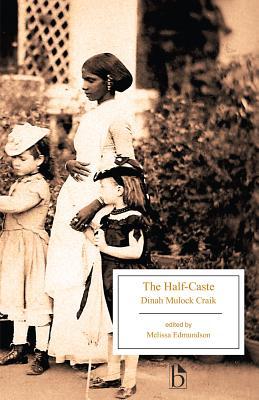ENGL 538 Reading Journal: The Half-Caste by Dinah Mulok Craik
 |
| Cover of The Half-Caste by Dinah Mulok Craik (Broadview Press) |
Reading Journal #2: Response to The Half-Caste
The Half-Caste is a brief story with multiple critical agendas. First, it presents the model Victorian gentleman that exemplified duty, honor, responsibility, and compassion. Second, it showcases Cassandra, the narrator, that must work as a governess because she lacks any male figures to provide for her as is Victorian custom. Third, Craik challenges the notions of race, class, superiority, and their associated perceptions of value in Victorian society.
Mr. Sutherland is Zillah’s guardian. After her both her parents pass away, he assumes responsibility, brings her to England, and entrusts her to her uncle’s care. The uncle, Mr. Le Poer subsequently denies her the knowledge of her last name lest she figure out what her actual standing in the family and the value of her mother’s fortune is. He spends the money Sutherland sends for Zillah on his own daughters, and he plots to keep Zilla ignorant so he can steal her inheritance. His wife, who comes across as browbeaten and subservient, is complicit in Zillah’s the subjugation and exploitation. Matilda implicates the whole family in the plot when she confides in Cassandra after her spat with Carry during the visit to the coast (Craik 70).
Craik paints Mr. Le Poer as a very smooth arch villain. He comes off as not quite credible or honest right from the start, but his charisma and demeanor blind the people he interacts with. More than once, Cassandra finds herself in a position or discussion to which she might object or with which she might disagree, but the smooth manner or Mr. Le Poer manages to overcome any objection. The numerous references to Le Poer as the perfect gentleman reinforce both his charisma and bearing and the implication that there is more afoot.
Mr. Le Poer’s son from a previous marriage, the young Lieutenant Le Poer, seems to have inherited his father’s avarice and his unscrupulous nature. Once Carry tells him about Zillahs’ fortune, he tries to elope with her and to steal her fortune both from her and out from under his father. At first, I thought this might have been a plan that father and son agreed upon and, perhaps, the whole reason father and son met on the coast was to facilitate the introduction, but we never get any clarity on this. It is possible that the younger Le Poer acts on his own after Carry reveals her parents plans to him.
Cassandra is interesting because she narrates the story and, in the process, reveals her own biases and her changes of opinion. Her relationship with Zillah doesn’t exactly start off with much warmth. She appears to buy into the racist stereotypes of the era when she first meets Zillah and describes her as “a half-caste girl—with an olive complexion, full Hindu lips… [and her] dull, heavy face had the stupidity of an ultrastupid [sic] child” (Craik 50). However, as she begins to form a relationship with the girl, it seems that the language she uses to describe her also takes on a more flattering tone. I’m not sure if this was an intentional method Craik used to symbolize Cassie’s changing attitude toward Zillah, but it certainly works well to imply the transformation of opinion. Not only do we see Cassie’s attitude changing through the way she describes Zillah, but we also get to see the insidious nature of racist stereotypes as revealed by a well-meaning narrator. The argument could be made that Cassie isn’t aware of the harsh bias she carries for Zillah at the beginning and that her transformation of opinion is also unconscious. It would make more sense for an aware narrator to caveat openly her harsh early descriptions as she retells the story, but Cassandra doesn’t do that. This also raises the question as to whether Cassandra would still harbor similar views to other “half-caste” people she might meet or if she’s made a singular exception of her biases toward them for Zillah as their relationship and bond grew.
Finally, Cassie’s role as governess and her affection for Sutherland make for an interesting plot point. She is obviously enamored with Sutherland and closer to him in age than Zillah by about a decade. However, he doesn’t appear to notice, or is unwilling to act on the opportunity for a relationship. We never find out why this might be the case, but it is possible to argue that as a governess, Cassandra is considered both inferior and invisible to Sutherland; he can’t see her for the woman she is.
Ultimately, I think this text addresses multiple issues that Craik had with Victorian society at the time, and while The Half-Caste is a relatively short work that doesn’t dive extremely deeply into any of the topics, it does a splendid job of making its point: It’s noble to take care and treat people fairly despite their origin and women working as governesses are exploited and often forced into the work because few roads to self-sufficiency exist as she writes about in “Self-Dependence” (Craik 89-90)
Works Cited
Craik, Dinah Mulok. The Half-Caste. Edited by Linda Peterson, Broadview, 2016.
---. “Appendix A: Dinah Mulok Craik on Gender Issues and Female Employment.” The Half-Caste. Edited by Linda Peterson, Broadview, 2016.

